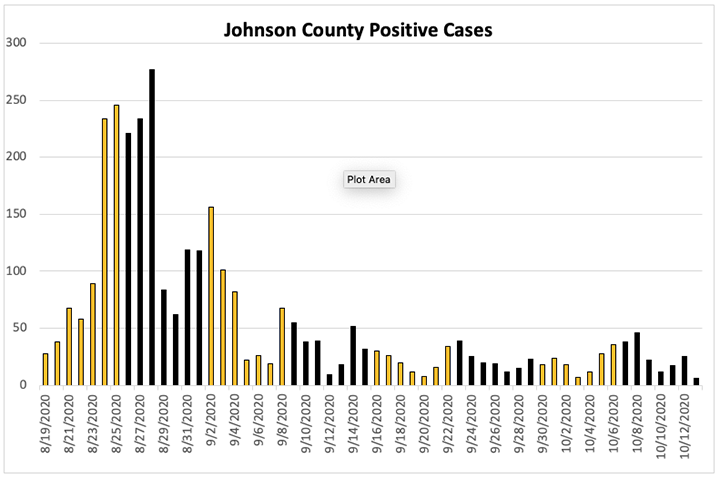Campus operations
The University of Iowa continues to monitor the spread of the COVID-19 virus within our community and surrounding counties. According to information from Johnson County Public Health, cases in Johnson County remain steady; however, we are concerned about the increase in other regions of the state. We must remain vigilant, as a community and if necessary will consider additional actions, in coordination with Johnson County Public Health, the Iowa Department of Public Health, and the Board of Regents, State of Iowa.

University of Iowa self-reported COVID-19 testing
These data reflect new cases since Oct. 12, 2020.
The University of Iowa has published an updated snapshot of self-reported positive COVID-19 tests from faculty, staff, and students.
Number of self-reported cases of COVID-19
Students
- New cases: 9
- Semester-to-date: 2,065
Employees
- New cases: 3
- Semester-to-date: 63
These numbers reflect only self-reported positive or presumed positive COVID-19 tests from UI faculty, staff, and students on the academic campus since Aug. 18, 2020. These data will not match data reported by UI Hospitals & Clinics or by the Iowa Department of Public Health for several reasons, including different testing time intervals and geographic scope. Students who also are employees of the university are only reported in the student number to avoid double counting. The UI has more than 30,000 students and nearly 30,000 employees. Many employees continue to work remotely but have self-reported to authorize sick leave.
Number of residence hall students in quarantine: 1*
Number of residence hall students in self-isolation: 3**
*Quarantine: Quarantine is used to keep someone who might have been exposed to COVID-19 away from others.
**Self-isolation: Isolation is used to separate people infected with the virus (those who are symptomatic and those with no symptoms) from people who are not infected.
Mental health resources: Caring for yourself and others during challenging times
Stress is a natural response to crisis and coping in the time of COVID-19 is an uncharted, life-changing task for everyone. Learning how to identify signs of stress, and how to help yourself, your colleagues, and anyone you care about can help.
Even if you are not directly impacted by the event, it is normal to feel anxious, scared, and uncertain about what the future may bring. Usually, these unsettling thoughts and feelings diminish as life starts to return to normal, but you can assist the process by keeping the following in mind:
- People react in different ways to natural disasters and traumatic events. There is no right or wrong way to think, feel, or respond. Be tolerant of your reactions and feelings, as well as the reactions and feelings of others.
- Ignoring your feelings will slow the healing process. It may seem better in the moment to avoid experiencing your emotions, but they exist whether you are paying attention to them or not.
- Talking about what you are feeling will help you heal. Just as you may find it difficult to face your feelings head on, you may also find it difficult to express those feelings to others. Talking with a calm, caring person is best, but expressing your feelings through journaling, art, and other creative outlets can also help.
For more tips on how to care for yourself and others during challenging times, check out the University of Iowa’s video library on taking care of yourself and each other during challenging times.
The Employee Assistance Program also offers additional advice and services, including free, confidential counseling for UI employees and their families.